高中英语必修二第二单元教案
- 格式:docx
- 大小:18.73 KB
- 文档页数:6
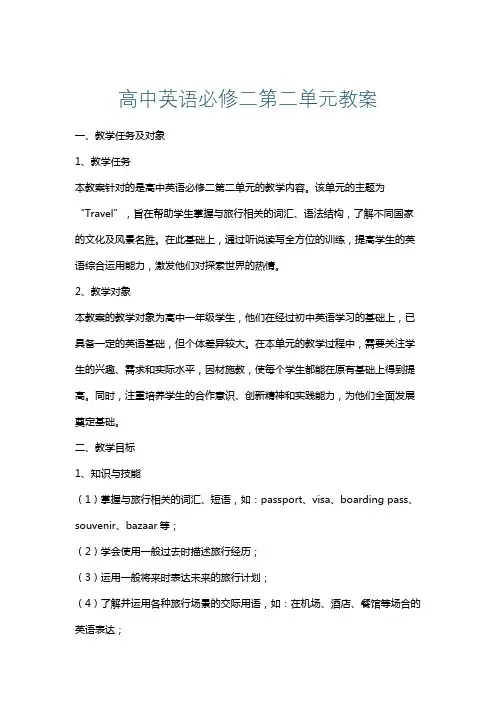
高中英语必修二第二单元教案一、教学任务及对象1、教学任务本教案针对的是高中英语必修二第二单元的教学内容。
该单元的主题为“Travel”,旨在帮助学生掌握与旅行相关的词汇、语法结构,了解不同国家的文化及风景名胜。
在此基础上,通过听说读写全方位的训练,提高学生的英语综合运用能力,激发他们对探索世界的热情。
2、教学对象本教案的教学对象为高中一年级学生,他们在经过初中英语学习的基础上,已具备一定的英语基础,但个体差异较大。
在本单元的教学过程中,需要关注学生的兴趣、需求和实际水平,因材施教,使每个学生都能在原有基础上得到提高。
同时,注重培养学生的合作意识、创新精神和实践能力,为他们全面发展奠定基础。
二、教学目标1、知识与技能(1)掌握与旅行相关的词汇、短语,如:passport、visa、boarding pass、souvenir、bazaar等;(2)学会使用一般过去时描述旅行经历;(3)运用一般将来时表达未来的旅行计划;(4)了解并运用各种旅行场景的交际用语,如:在机场、酒店、餐馆等场合的英语表达;(5)提高英语听力、口语、阅读、写作能力,尤其是描述性写作和叙述性写作能力。
2、过程与方法(1)通过小组合作、讨论、分享等形式,培养学生合作学习的能力;(2)通过听力、口语、阅读、写作等多种教学活动,提高学生英语综合运用能力;(3)运用任务型教学法,引导学生参与各种实践活动,如制定旅行计划、编写旅行日记等;(4)利用多媒体、网络资源等教学手段,拓展学生的知识视野,提高学习兴趣;(5)关注学生个体差异,实施个性化教学,使每个学生都能在原有基础上得到提高。
3、情感,态度与价值观(1)培养学生对英语学习的兴趣,激发他们学习英语的热情;(2)通过了解不同国家的文化及风景名胜,拓展学生的国际视野,增强跨文化交际意识;(3)教育学生尊重、包容不同文化,培养他们的全球观念;(4)引导学生关注环境保护,培养他们的环保意识和责任感;(5)鼓励学生积极参与社会实践,提高他们的团队协作能力和解决问题的能力。
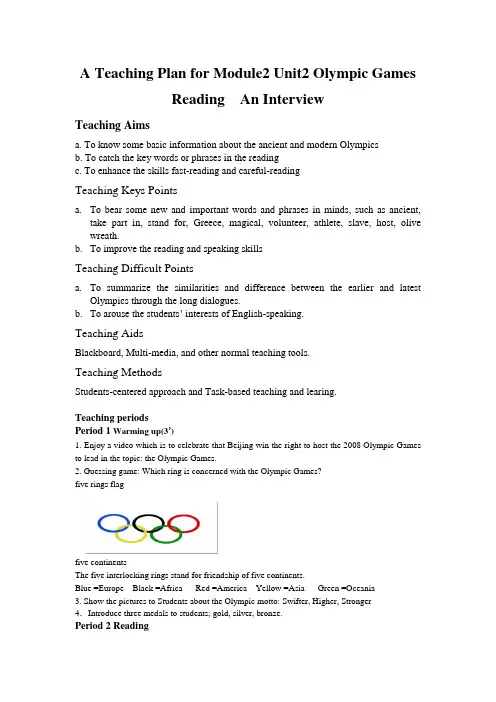
A Teaching Plan for Module2 Unit2 Olympic GamesReading An InterviewTeaching Aimsa. To know some basic information about the ancient and modern Olympicsb. To catch the key words or phrases in the readingc. To enhance the skills fast-reading and careful-readingTeaching Keys Pointsa.To bear some new and important words and phrases in minds, such as ancient,take part in, stand for, Greece, magical, volunteer, athlete, slave, host, olive wreath.b.To improve the reading and speaking skillsTeaching Difficult Pointsa.To summarize the similarities and difference between the earlier and latestOlympics through the long dialogues.b.To arouse the students’ interests of English-speaking.Teaching AidsBlackboard, Multi-media, and other normal teaching tools.Teaching MethodsStudents-centered approach and Task-based teaching and learing.Teaching periodsPeriod 1 Warming up(3’)1. Enjoy a video which is to celebrate that Beijing win the right to host the 2008 Olympic Games to lead in the topic: the Olympic Games.2. Guessing game: Which ring is concerned with the Olympic Games?five rings flagfive continentsThe five interlocking rings stand for friendship of five continents.Blue =Europe Black =Africa Red =America Yellow =Asia Green =Oceania3. Show the pictures to Students about the Olympic motto: Swifter, Higher, Stronger 4.Introduce three medals to students; gold, silver, bronze.Period 2 ReadingStep1 Pre-reading(6’)A. Let us have a competition to check who know the most knowledge about the Olympic Games1.When and where did the ancient Olympic Games start?A. 776BC; in GreeceB. 776 AD.; in Greece2. Who was China’s first gold medal winner and for what event?A.Xu Haifeng; shootingB. Xie Jun running3. Who got the golden medal in 110-metre hurdle in 2004 Olympic Games?A Liu Xiang B. Li Xiaopeng C. Fu Mingxia4. Which one is the mascot of Beijing Olympics?A B C D5 What is the motto of Beijing Olympic Games?A Welcome to Beijing B. One world one dream C New Beijing New OlympicsB. Before reading, teacher teaches students to read the new words.ancient, take part in, stand for, Greece, magical, volunteer, athlete, slave, host, olive wreath.Step2 While-reading(19’)1. Fast reading : True or False.( )1. Women and slaves were allowed to take part in the ancient Olympic Games.( )2. The 2012 Olympic Games will be held in China.( )3. In the modern Olympics, the winner will be given olive wreath.( )4. A special village is built for competitors to live in.( )5. The modern Olympics are held every four years.2. Careful readingTell the difference between ancient and modern Olympics according to the reading passage. What do they mainly talk about?A. History about the Olympic GamesB. The differences and similarities between the ancient and modern Olympic GamesC. 2008 Olympic GamesName The ancient Olympics The modern OlympicsTime every four yearsPlace in GreecePeople men and womenStep3: Post-readingDiscussion(8’)Imagine if the Olympic Games will be held in Hainan, what can we do for it? (Teacher will give some hints to Ss , such as behavior, language, environment, culture.)1.Encourage the public to plant more trees and grass.2.Have good manners in public so as to leave a good impression on foreigners.3.Have a good knowledge of English and encourage the public speak English widely.4.Be Volunteers to be guides for foreigners5.Learn the spirit of the Olympic Games and regard its motto as life and study motto.6.Spread our local culture to other people,especially foreigners.Period3 Revision (3’)1.What words have we learnt?athlete运动员take part in 参与stand for代表…2.What useful structures have we learnt?Passive voice(被动语态):sth be done/ sth will be done…3.What information do we get from thetext?The similarities and difference betweenthe ancient and modern Olympics.Period4 Homework (1’)1.Surf the Internet to learn more information about Olympic Games2.Find out and underline the important language points in this unit.3.Prepare for the next period.。
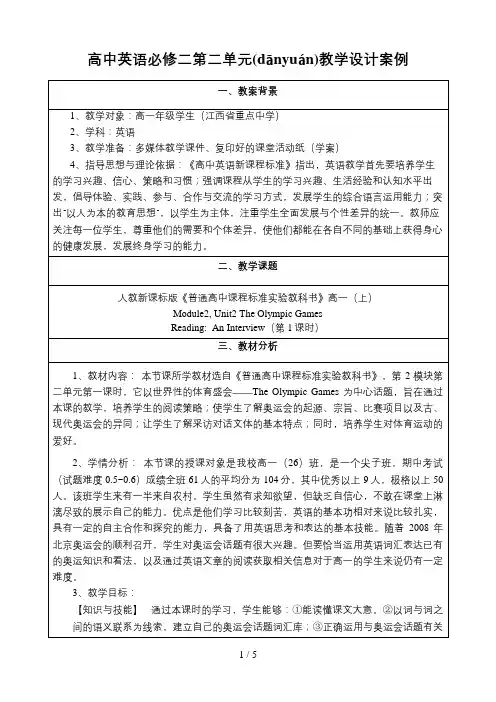
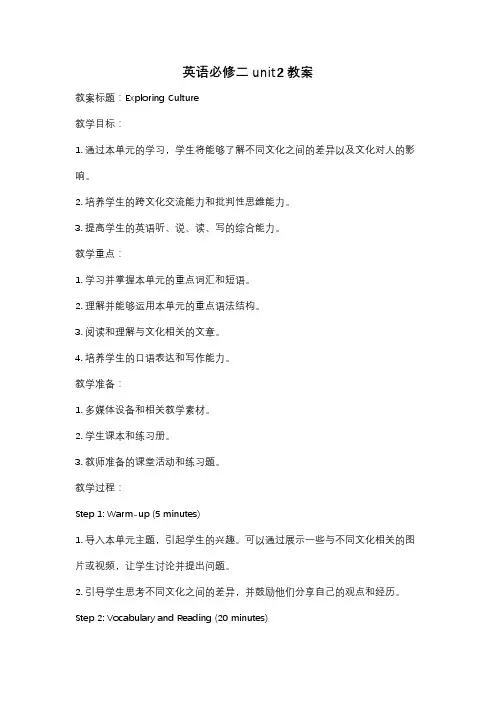
英语必修二unit2教案教案标题:Exploring Culture教学目标:1. 通过本单元的学习,学生将能够了解不同文化之间的差异以及文化对人的影响。
2. 培养学生的跨文化交流能力和批判性思维能力。
3. 提高学生的英语听、说、读、写的综合能力。
教学重点:1. 学习并掌握本单元的重点词汇和短语。
2. 理解并能够运用本单元的重点语法结构。
3. 阅读和理解与文化相关的文章。
4. 培养学生的口语表达和写作能力。
教学准备:1. 多媒体设备和相关教学素材。
2. 学生课本和练习册。
3. 教师准备的课堂活动和练习题。
教学过程:Step 1: Warm-up (5 minutes)1. 导入本单元主题,引起学生的兴趣。
可以通过展示一些与不同文化相关的图片或视频,让学生讨论并提出问题。
2. 引导学生思考不同文化之间的差异,并鼓励他们分享自己的观点和经历。
Step 2: Vocabulary and Reading (20 minutes)1. 教师通过多媒体展示本单元的重点词汇和短语,并进行解释和示范。
2. 学生跟读和模仿,并进行词汇练习。
3. 学生阅读课文,并回答相关问题,以检查他们的阅读理解能力。
4. 分组讨论课文中的文化差异和文化冲突,并汇报给全班。
Step 3: Listening and Speaking (15 minutes)1. 学生听一段关于跨文化交流的对话,并回答相关问题,以提高他们的听力理解能力。
2. 学生进行小组讨论,以分享自己的文化经验和观点。
3. 随机选择几个小组进行展示和讨论。
Step 4: Grammar and Writing (20 minutes)1. 教师讲解本单元的重点语法结构,并进行相关练习。
2. 学生进行写作练习,以描述自己所熟悉的文化活动或节日。
3. 学生互相交换作文,并进行修改和改进。
Step 5: Consolidation and Extension (10 minutes)1. 教师总结本节课的重点内容,并进行复习。
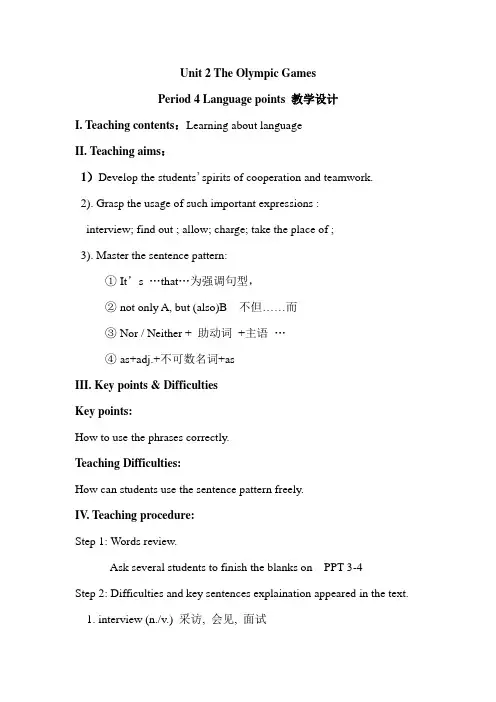
Unit 2 The Olympic GamesPeriod 4 Language points 教学设计I. Teaching contents:Learning about languageII. Teaching aims:1)Develop the students’ spirits of cooperation and teamwork.2). Grasp the usage of such important expressions :interview; find out ; allow; charge; take the place of ;3). Master the sentence pattern:①It’s …that…为强调句型,②not only A, but (also)B 不但……而③Nor / Neither + 助动词+主语…④as+adj.+不可数名词+asIII. Key points & DifficultiesKey points:How to use the phrases correctly.Teaching Difficulties:How can students use the sentence pattern freely.IV. Teaching procedure:Step 1: Words review.Ask several students to finish the blanks on PPT 3-4Step 2: Difficulties and key sentences explaination appeared in the text.1. interview (n./v.) 采访, 会见, 面试interviewer (采访者)interviewee (被采访者)2. find out 查明,弄清情况find sb. out 查处(坏人);识破3. It+be +被强调部分+that/who+句子其余部分。
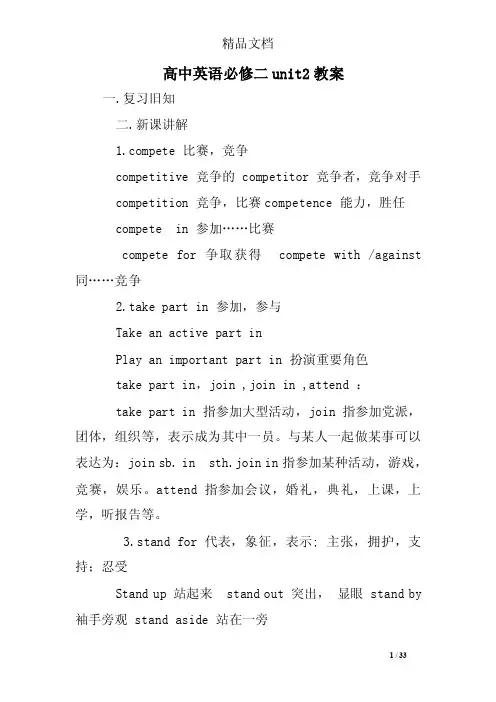
高中英语必修二unit2教案一.复习旧知二.新课讲解pete 比赛,竞争competitive 竞争的 competitor 竞争者,竞争对手 competition 竞争,比赛competence 能力,胜任compete in 参加……比赛compete for 争取获得 compete with /against 同……竞争2.take part in 参加,参与Take an active part inPlay an important part in 扮演重要角色take part in,join ,join in ,attend :take part in 指参加大型活动,join指参加党派,团体,组织等,表示成为其中一员。
与某人一起做某事可以表达为:join sb. in sth.join in指参加某种活动,游戏,竞赛,娱乐。
attend 指参加会议,婚礼,典礼,上课,上学,听报告等。
3.stand for 代表,象征,表示; 主张,拥护,支持;忍受Stand up 站起来 stand out 突出,显眼 stand by 袖手旁观 stand aside 站在一旁4.admit 准许进入,准许参加,接纳,承认be admitted to/into 被准许进入admit doing/that…承认做了……admit sb./sth. to be /as…承认某人/某物是…5.nor/neither 也不倒装结构 nor/neither +助动词/be/情态动词+主语表示某人某物也不……类似于so的用法 So+主语+助动词/be/情态动词表示某人某物的确……6.as well 也,又,还 as well as 和……一样might/may as well do 我们不妨/还是…吧 besides ,in addition to 除……之外还有as well,also,too,either 的区别as well前面不用逗号,放在句尾,用在肯定句,疑问句中also 一般放在be/情态动词/助动词之后,实义动词之前too放在句中或句末,通常用逗号隔开,用于肯定句,疑问句中。
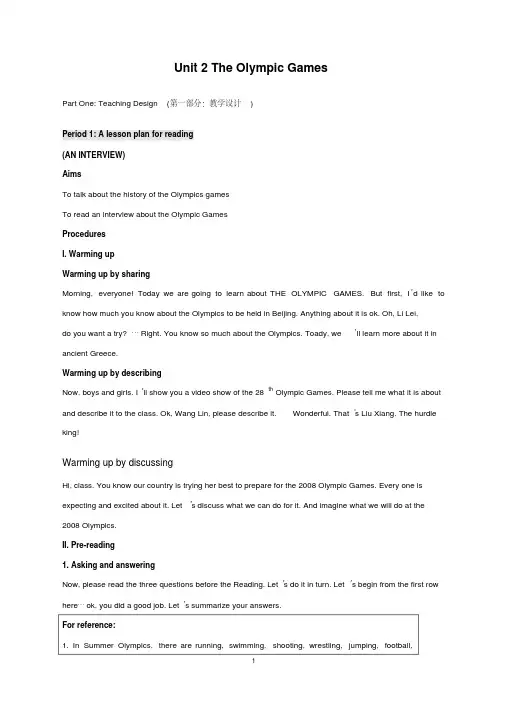
Unit 2 The Olympic GamesPart One: Teaching Design (第一部分:教学设计)Period 1: A lesson plan for reading(AN INTERVIEW)AimsTo talk about the history of the Olympics gamesTo read an interview about the Olympic GamesProceduresI. Warming upWarming up by sharingMorning, everyone! Today we are going to learn about THE OLYMPIC GAMES. But first, I’d like to know how much you know about the Olympics to be held in Beijing. Anything about it is ok. Oh, Li Lei,do you want a try?…Right. You know so much about the Olympics. Toady, we’ll learn more about it in ancient Greece.Warming up by describingNow, boys and girls. I’ll show you a video show of the 28th Olympic Games. Please tell me what it is about and describe it to the class. Ok, Wang Lin, please describe it. Wonderful. That’s Liu Xiang. The hurdle king!Warming up by discussingHi, class. You know our country is trying her best to prepare for the 2008 Olympic Games. Every one is expecting and excited about it. Let’s discuss what we can do for it. And imagine what we will do at the 2008 Olympics.II. Pre-reading1. Asking and answeringNow, please read the three questions before the Reading. Let’s do it in turn. Let’s begin from the first row here…ok, you did a good job. Let’s summarize your answers.For reference:1. In Summer Olympics, there are running, swimming, shooting, wrestling, jumping, football,1。
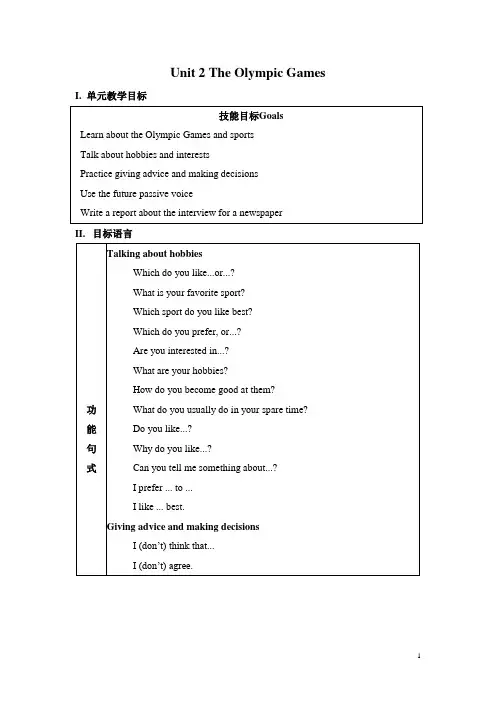
Unit 2 The Olympic Games I. 单元教学目标II. 目标语言III. 教材分析和教材重组1. 教材分析本单元以Olympic Games 为话题,旨在通过本单元教学,使学生了解奥运会的起源、宗旨、古代奥运会与现代奥运会的区别和相似之处以及比赛项目。
同时培养学生对体育运动的爱好。
在口语表达中,要求学生学会询问别人的兴趣爱好,以及如何向别人推荐自己的某一种爱好。
1.1 Warming Up通过对关于Olympic Games 的8个问题的提问,让学生根据对奥运知识的了解回答问题,目的在于激活同学们所了解的奥运知识,激发学生学习本单元的兴趣。
1.2 Pre-Reading通过学生对三个问题的讨论与交流,使他们了解奥运会有关知识。
1.3 Reading通过古希腊的一位作家到现代社会采访一位中国女孩的方式,介绍奥运会的有关知识,也让学生们了解了古代奥运会和现代奥运会的异同。
1.4 Comprehending是利用表格和问题的形式对文章进行分析,要求同学们找出古代与现代奥运会的异同点以及对文章内容细节的理解。
1.5 Learning about Language分词汇和语法两部分。
第一部分Discovering useful words and expressions 中的第一个练习,根据课文的上下语境的理解词意,写出英文解释所对应的单词。
第二个练习是要求同学们通过熟悉的近义词或短语来掌握课文中出现的新的词和短语。
第三个练习则是一篇小短文,要求同学们用所给的单词的正确形式填空。
第二部分Discovering useful structures则通过3 个练习来巩固同学们对将来时态的被动语态使用。
1.6 Using Language分为Reading and Listening,Speaking and Writing两部分。
Reading “The story of Atlanta”是一篇古希腊的故事。
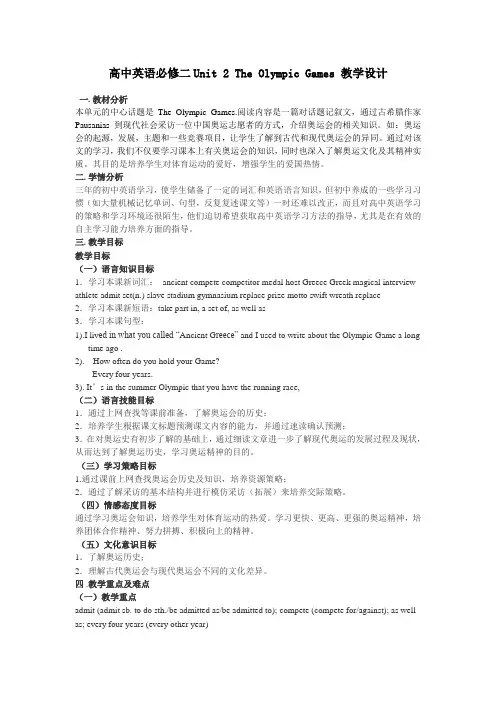
高中英语必修二Unit 2 The Olympic Games 教学设计一. 教材分析本单元的中心话题是The Olympic Games.阅读内容是一篇对话题记叙文,通过古希腊作家Pausanias到现代社会采访一位中国奥运志愿者的方式,介绍奥运会的相关知识。
如:奥运会的起源,发展,主题和一些竞赛项目,让学生了解到古代和现代奥运会的异同。
通过对该文的学习,我们不仅要学习课本上有关奥运会的知识,同时也深入了解奥运文化及其精神实质。
其目的是培养学生对体育运动的爱好,增强学生的爱国热情。
二. 学情分析三年的初中英语学习,使学生储备了一定的词汇和英语语言知识,但初中养成的一些学习习惯(如大量机械记忆单词、句型,反复复述课文等)一时还难以改正,而且对高中英语学习的策略和学习环境还很陌生,他们迫切希望获取高中英语学习方法的指导,尤其是在有效的自主学习能力培养方面的指导。
三. 教学目标教学目标(一)语言知识目标1.学习本课新词汇:ancient compete competitor medal host Greece Greek magical interview athlete admit set(n.) slave stadium gymnasium replace prize motto swift wreath replace2.学习本课新短语:take part in, a set of, as well as3.学习本课句型:1).I liv ed in what you called “Ancient G reece” and I used to write about the Olympic Game a longtime ago .2).---How often do you hold your Game?---Every four years.3). It’s in the summer Olympic that you have the running race,(二)语言技能目标1.通过上网查找等课前准备,了解奥运会的历史;2.培养学生根据课文标题预测课文内容的能力,并通过速读确认预测;3.在对奥运史有初步了解的基础上,通过细读文章进一步了解现代奥运的发展过程及现状,从而达到了解奥运历史,学习奥运精神的目的。
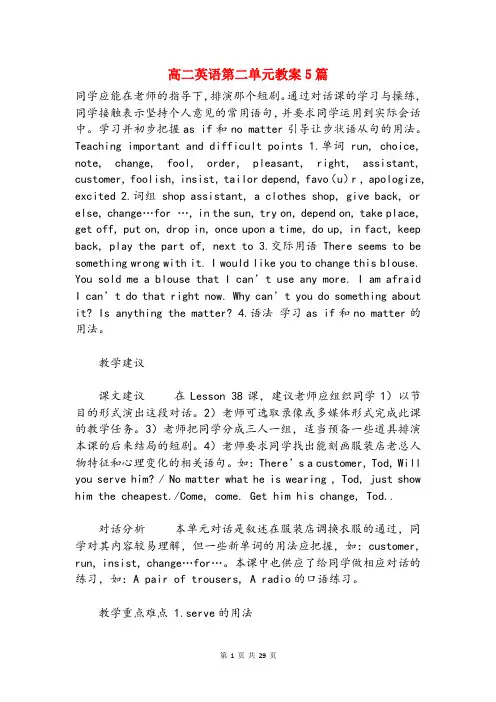
高二英语第二单元教案5篇同学应能在老师的指导下,排演那个短剧。
通过对话课的学习与操练,同学接触表示坚持个人意见的常用语句,并要求同学运用到实际会话中。
学习并初步把握as if和no matter引导让步状语从句的用法。
Teaching important and difficult points 1.单词 run, choice, note, change, fool, order, pleasant, right, assistant, customer, foolish, insist, tailor depend, favo(u)r , apologize, excited 2.词组 shop assistant, a clothes shop, give back, or else, change…for …, in the sun, try on, depend on, take place, get off, put on, drop in, once upon a time, do up, in fact, keep back, play the part of, next to 3.交际用语 There seems to be something wrong with it. I would like you to change this blouse. You sold me a blouse that I can’t use any more. I am afraid I can’t do that right now. Why can’t you do something about it? Is anything the matter? 4.语法学习as if和no matter的用法。
教学建议课文建议在Lesson 38课,建议老师应组织同学1)以节目的形式演出这段对话。
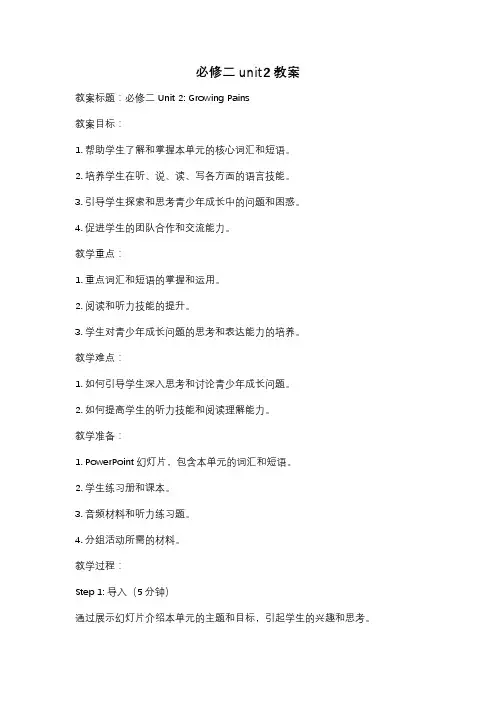
必修二unit2教案教案标题:必修二Unit 2: Growing Pains教案目标:1. 帮助学生了解和掌握本单元的核心词汇和短语。
2. 培养学生在听、说、读、写各方面的语言技能。
3. 引导学生探索和思考青少年成长中的问题和困惑。
4. 促进学生的团队合作和交流能力。
教学重点:1. 重点词汇和短语的掌握和运用。
2. 阅读和听力技能的提升。
3. 学生对青少年成长问题的思考和表达能力的培养。
教学难点:1. 如何引导学生深入思考和讨论青少年成长问题。
2. 如何提高学生的听力技能和阅读理解能力。
教学准备:1. PowerPoint幻灯片,包含本单元的词汇和短语。
2. 学生练习册和课本。
3. 音频材料和听力练习题。
4. 分组活动所需的材料。
教学过程:Step 1: 导入(5分钟)通过展示幻灯片介绍本单元的主题和目标,引起学生的兴趣和思考。
Step 2: 词汇和短语学习(15分钟)使用幻灯片呈现本单元的核心词汇和短语,并进行解释和示范。
然后,进行词汇练习,包括单词拼写、词义选择等。
Step 3: 听力训练(20分钟)播放相关的听力材料,让学生进行听力理解和填空练习。
随后,进行听力答案的讨论和解析。
Step 4: 阅读理解(20分钟)学生阅读课本中与本单元相关的文章,并回答相关的问题。
教师可以提供适当的指导和解读。
然后,学生可以进行小组讨论,分享彼此的答案和观点。
Step 5: 讨论和表达(15分钟)教师引导学生讨论青少年成长中的问题和困惑,并鼓励学生表达自己的观点和经验。
可以采用小组讨论或全班讨论的形式。
Step 6: 小结和作业布置(5分钟)教师对本节课进行小结,并布置相关的作业,如完成练习册的相关练习、写一篇关于青少年成长问题的短文等。
教学延伸:1. 邀请一位青少年成长问题的专家或家长来进行讲座或座谈,让学生更深入地了解和思考这个话题。
2. 组织学生进行小组或个人项目,调查和研究青少年成长问题,并展示他们的发现和观点。
人教新课标版高中英语必修2 第2单元阅读课教案一、教学课型:阅读课本课的Reading An Interview是一篇对话形式的课文,围绕单元中心话题The Olympic Games而展开。
通过学习本篇课文,让学生了解对话文体的特点,训练学生概括文章主旨和寻找相关细节的能力;引导学生了解有关奥运会的信息,并体会中国成为2022年奥运会东道主的喜悦和自豪感,由此引发学生思考在奥运会到来之际,自己能为奥运做些什么。
二、教材分析1. 教学内容(见教材第9 11页内容)2. 教材处理本单元的Warming-up是围绕奥运会这一话题展开的。
笔者要求学生在课前利用网络和书籍收集与奥运会有关的信息,并补充了一些有关奥运会比赛项目的英语表达法。
把Warming-up和词汇学习等整合成一节课。
这样,原先单一的对话变成了一个完整的故事,更贴近学生的生活,也更容易被学生所理解。
笔者还重新设计了Comprehending中的表格和问题,使之更加紧扣文章的主题,更符合学生的认知特点和实际情况,以便学生更好地完成任务,体验学习成功的快乐。
3. 教学目标(1)引导学生运用阅读技巧把握课文主题,理解课文细节,并培养学生概括文章大意和口头表达的能力;(2)引导学生了解奥运会的相关知识,包括古代奥运会的由来和发展、现代奥运会的概况以及中国的奥运之路,并引导学生在阅读中思考如何使奥运精神深入人心;(3)要求学生掌握一些有关奥运的英语表达,提高学生谈论有关体育话题的语言交际能力。
4. 教学重点和难点(1)培养学生的阅读技巧,即把握文章主旨和理解课文细节的能力;(2)提高学生概括文章大意的能力;(3)激发学生的情感,提高学生表达思想的能力。
三、教学步骤设计1. 总体思路笔者在本节阅读课的教学设计中采用了多媒体教学等辅助手段,在学生阅读过程中分别安排了小组竞赛抢答、观看图片回答问题、四人小组讨论以及集体回答等多种活动,旨在启发学生的思维,使学生通过亲身体验和相互合作,在真实的交流中提高获取信息和处理信息的能力。
名师精编优秀教案高中英语必修二Unit 2教案pete 比赛,竞争competitive 竞争的competitor 竞争者,竞争对手competition 竞争,比赛competence 能力,胜任compete in 参加……比赛compete for 争取获得compete with /against 同……竞争2.take part in 参加,参与Take an active part inPlay an important part in 扮演重要角色take part in,join ,join in ,attend :take part in 指参加大型活动,join指参加党派,团体,组织等,表示成为其中一员。
与某人一起做某事可以表达为:join sb. in (doing) sth. join in指参加某种活动,游戏,竞赛,娱乐。
attend 指参加会议,婚礼,典礼,上课,上学,听报告等。
3.stand for 代表,象征,表示; 主张,拥护,支持;忍受Stand up 站起来stand out 突出,显眼stand by 袖手旁观stand aside 站在一旁4.admit 准许进入,准许参加,接纳,承认be admitted to/into 被准许进入admit doing/that…承认做了……admit sb./sth. to be /as…承认某人/某物是…5.nor/neither 也不倒装结构nor/neither +助动词/be/情态动词+主语表示某人某物也不……类似于so的用法So+主语+助动词/be/情态动词表示某人某物的确……6.as well 也,又,还as well as 和……一样might/may as well do 我们不妨/还是…吧besides ,in addition to 除……之外还有as well,also,too,either 的区别as well前面不用逗号,放在句尾,用在肯定句,疑问句中also 一般放在be/情态动词/助动词之后,实义动词之前too放在句中或句末,通常用逗号隔开,用于肯定句,疑问句中。
Either 放在句尾7.as…as和……一样第一个as为副词,第二个as为连词,用来连接一个比较状语从句,但常省略与主句相同的成分。
原文再现:There is as much competition among counties to host the Olympics as to win Olympic medals.国与国之间争取奥运会承办权的竞争就跟夺奥运奖牌一样激烈。
As….as 运用形式:(倍数times)1).as+adj/adv+as…2).as+adj+可数名词复数或不可数名词+as…3).as+adj+a/an+可数名词单数+as…German is just as difficult to learn as English.You must give flowers as much water as they need.The room is four times as large as ours.8.replace 取代,替换,把……放回原处ReplacementReplaceableReplace sth.Replace…with/by..用…代替Take the place of代替In place of sb./sth.=in sb.’s/sth.’s place 代替In place 在适当的位置Out of place 不适合的,在不适当的位置With everything in place,she started the slide show.一切就绪,她开始播放幻灯片Replace soda with water.用水取代苏打。
It would be difficult to find a man to take the place of the present manager.找一个人来代替现在的经理是不容易的。
9.charge vt&vi收费,控诉,充电n.费用,主管Charge…for…索价,要价Charge sb. with sth.=accuse sb. of wth. 指控某人In charge of sth.负责、主管某事In the charge of sb. 由某人负责Take charge of 负责,主管Free of charge 免费Charge a battery 给电池充电Cost,charge,price,fee,fare的区别Cost指生产某东西的成本,代价Charge 指商品或服务所需的费用Price 指商品在市场上出售时的价格,尤指商品的单价Fee指上学、求医、找律师收取的费用Fare 侧重旅行时所付的车费,船费(交通费用)What did they charge for the repairs? 他们收了多少维修费用The house in the downtown cost him 3 million yuan. 市中心的房子花了他300万元。
Airplane fares have gone up again. 飞机票又涨价了。
I won’t buy that type of car at that price. 我不会以那个价格买那种类型的车。
Who paid the fee for hosting the party、谁出的钱举办聚会?10.as 在定语从句中可以充当主语、宾语和表语,经常和such ,so ,the same 连用,当先行词被such,so,the same 修饰时,关系代词用as.短语the same…as 指同一类the same…that 指同一物Your have such a beautiful dress as I bought yesterday.You have the same dress as I bought yesterday.This is the same dictionary as I bought .(这和我昨天买的词典一样)11.advertise vt&vi做广告,登广告Advertise sth.登广告宣传某物Advertisement 广告Advertise for 公布,招聘We should advertise for someone to look afer the garden.If you want to sell your goods, you had better put an advertisement on TV.12.instruction n.指示,命令,说明,教授Instruct v.指示,命令instructor 教练instruct sb. to do sth.命令某人做事Instruct that…指示…Instructions, explanation, introduction区别Instructions 表示用法说明,操作指南Explanation 指解释,对别人的口头说明,诠释Introduction 指对用途和人物的介绍He gave us instructions to finish this matter as soon as possible.他指示我们尽快完成这件事情。
1.marry意为结婚;嫁;娶;与......结婚等,既可用作及物动词,也可用作不及物动词marry sb表示嫁给某人;与......结婚John married Mary last week.上星期约翰和玛丽结婚了be/get married to sb表示与某人结婚Jane was married to a doctor last month. 上个月简和一位医生结婚了。
Rose got married to a teacher.罗斯和一位教师结婚了。
marry sb. 主持某人的婚礼,和某人结婚marry sb to sb表示父母把女儿嫁给某人或为儿子娶媳妇She married her daughter to a businessman.她把女儿嫁给了一位商人。
marry作不及物动词时,往往用副词或介词短语来修饰She married very early. 她很早就结婚了。
2.bargain vi 讨价还价,讲条件n.便宜货,协议,交易make a bargain with sb. 与某人达成协议bargain with sb. about sth.与某人协商某事He made a bargain with his wife,”You do the shopping and I cook.”他同妻子协商:“你购物,我做饭。
”3.pick up 拾起,捡起发现,收听到I pick up Radio Beijing.恢复He picks up his strength.收拾,整理You should pick up your clothes on the bed.增加We pick up speed when we went downhill.取回We sent a worker to pick up your goods.学到I learnt some French when I was on the train.4.golden 金黄色的,美好的,可贵的,镀成金色的gold 金制得(材质)The girl has golden hair.She has a gold watch which she likes very much.5.deserve vi&vt 应受,值得(用作应受时,通常用被动语态;用作值得时,通常用主动语态)Do you think Hippomenes deserved to win the race?Guilin deserves a visit.deserving 应得的deserve well/ill of 应受…的奖赏/惩罚deserve doing /to be done 值得被……You deserve her praise.课外扩充at all (用于否定句)丝毫(不),一点(不)at first 最初,起初at last 终于,最后at least 至少at most 至多,不超过at no time 从不,决不at once 马上,立刻;同时,一起at present 目前,现在at the cost/expense of 以……为代价at the end of在…的末尾at the moment 此刻,目前at the same tine 同时;然而,不过laugh at 因……而发笑;嘲笑look at 看着;看待by accident偶然by chance偶然,碰巧by mistake错误地,无意中(做错了某事)by no means决不,绝没有by oneself单独地,独自地by the way顺便地,附带说说learn by heart记住,背诵little by little一点一点地,逐渐地side by side肩并肩地,一起one by one一个接一个by the day/ hour按天/小时。